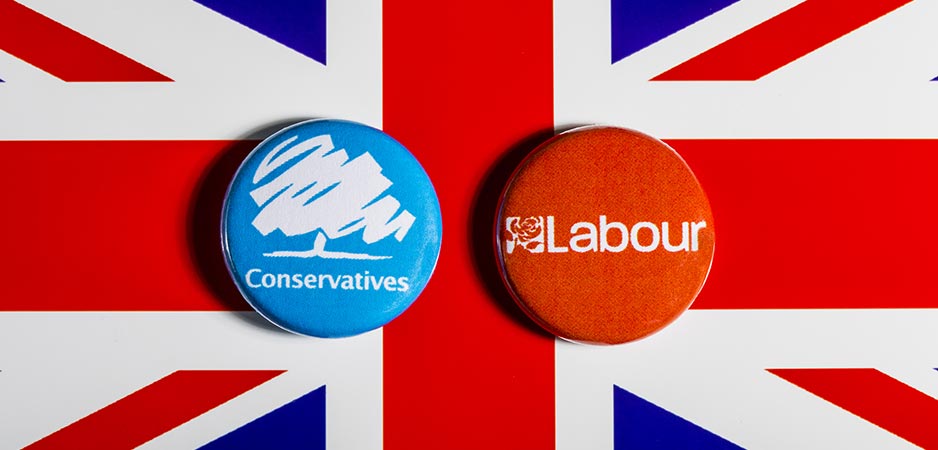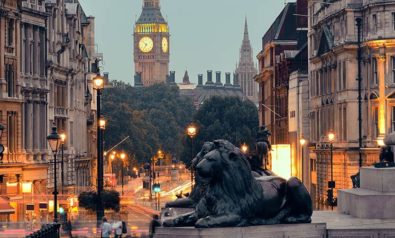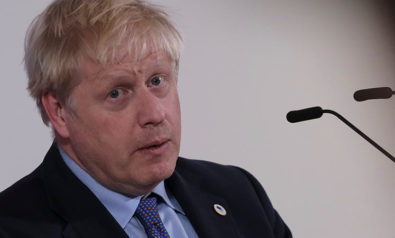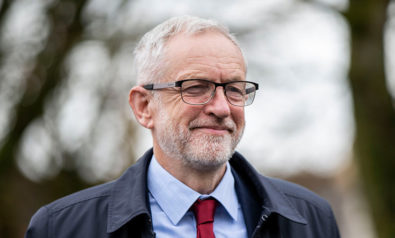For all its complexity, everyone understands what the US is. But what is the United Kingdom? Most people around the world have never quite understood what geographical and political unity is referred to in its name. Nor do they understand the question of where its boundaries are located.
360° Context: Britain Faces a Historic Election
The debate about the Irish backstop means that the British themselves are now unsure about the answer to that question. Even more mysterious to non-Brits is the question of how a declared “constitutional monarchy” with a high-profile royal family is governed. Many who wonder about what is united in the United Kingdom also ask themselves the question: What is great about Great Britain? The nation is on the fringes of Europe and about to drift out to sea, guided by its new and as yet unelected navigator, Prime Minister Boris Johnson. Can it really be called both great and united?
Never has the official name of a nation contained a more misleading description of its reality. It’s true that every so often — thanks to the mysterious and anonymous Electoral College that, in recent years, elected two luminous US presidents, George W. Bush and Donald Trump, who actually lost the popular vote — the world is reminded that the 50 states of the US have, from the point of view of pure democracy, never been formally united. But no one inside or outside the US entertains any doubts about the unified power and universal purpose of the nation, however chaotic its leadership and however contradictory its policies.
The Crisis of Cultural and Political Authority
In contrast, the UK clearly lost both its sense of power and unique purpose with the dissolution of the British Empire following World War II. It has been struggling to find it ever since. After a decade of “angry young men” who appeared to be lost souls, The Beatles, Carnaby Street and Monty Python brought what was once remembered as “Merry England” back to life in terms of cultural impact in the second half of the 1960s. In the 1980s, Prime Minister Margaret Thatcher, embracing the sobriquet of the “Iron Lady,” profiting from the windfall of North Sea oil, endowed the nation with a form of ideological leadership that helped define the belief system of late 20th-century globalized capitalism.
But Thatcher couldn’t have done it alone. She thrived in the shadow of US President Ronald Reagan. Whereas she earned her stripes and achieved her glory thanks to the skirmish called the Falklands War, Reagan stepped up in front of the microphones and TV cameras to lead the war against an “evil empire.” Eventually (some people say) his policies defeated it because that empire imploded in 1989.
Thatcher nevertheless committed Britain to a position of relative strength in the expanding European Union largely because of her belief in the commercial value of the European single market. She never believed in the EU as a political entity. For a while, though, she felt there was a real possibility of achieving “Thatcherism on a European scale.” The ambiguity of her attitude set the stage for the drama of Brexit that would unfold under David Cameron’s premiership a quarter of a century after her departure from politics.
Following Thatcher by a decade, Tony Blair reconstructed Labour partly in Thatcher’s image, profiting from the renewed prestige the Iron Lady had earned for the nation. Just as Thatcher’s authority depended on her game of mirrors with Reagan in the White House, Blair prospered by becoming the accomplice of Bill Clinton and then, slightly less comprehensibly, George W. Bush. In contrast with other prime ministers, both Thatcher and Blair excelled at rhetorical leadership in the absence of global political power.
Can the Omelet Return the State of Whole Eggs?
Now, after nearly four years of Brexit melodrama, the lingering divide over “remain” versus “leave” has produced and prolonged an existential debate around the identity of a kingdom that is manifestly no longer united. To complicate things further, after the seemingly never-ending cliffhanger of Theresa May’s negotiated EU withdrawal agreement, the nation is now in the throes of preparing for a general election on December 12 in the hope of achieving some form of closure. Unlike the straightforward electoral battles of the past, this campaign puts on full display the visible, profound disunity of the two dominant parties, the Conservatives and Labour. Divided by Brexit, the internal wrangling of the parties has significantly contributed to the general, rudderless disunity of the nation.
The two parties are not only divided between “remain” and “leave,” but the “leavers” themselves, especially among the Tories, are divided over a hard and soft Brexit. As if that wasn’t enough, they are further divided over the personalities of their two leaders: Boris Johnson — an ambitious, mendacious and narcissistic upstart — and Jeremy Corbyn, apparently too puritanically socialist for the taste of some in his party (especially the Blairite loyalists who truly believe in the merits of capitalism).
Then there are the parties that actually know what they want — the Liberal Democrats, on one side, and the Brexit Party, on the other. But even those who agree with their relatively simple electoral credo (“remain” for the Lib Dems and “leave” for the Brexit Party) appear, according to recent polls, to be drifting away from parties that have no chance of governing and even less of bridging the growing divide if called upon to govern.
Adding to the confusion is the increasingly doubtful status of Northern Ireland and Scotland within a future version of the unified kingdom. In Johnson’s new “acceptable” draft of a withdrawal treaty from the EU, Northern Ireland will effectively remain within the European customs and tariffs zone while remaining politically “united” with the UK government in London. At least during a period of transitioning to something else, it will retain a soft border with the Republic of Ireland and acquire a hard border with its own nation.
It required great British ingenuity to come up with that solution, much more than Lewis Carroll’s seven maids with seven mops could have done when planning to clear the sand from a beach. At the same time, Scotland — a country but not a nation — whose population voted to remain within the EU, will most likely hold a new referendum for independence, with the ambition of having its own place in Europe once the government in Westminster finalizes Brexit. That will give new life to Hadrian’s Wall, possibly provoking a fit of jealousy on the part of Donald Trump who could well end up accusing the Roman emperor of stealing his ideas.
Can Gravity Restore Its Dissipating Force?
In short, the picture of the nation that emerges is that of a complex series of powerful centrifugal forces pushing away from the unified center, with no gravitational force to pull any of the elements back together. Unless, of course, we are to believe that the magnetic personality of Prime Minister Johnson can somehow provide that missing gravitational force. If toward the end of the 17th century the Englishman Isaac Newton could offer the world gravity — until then an unknown concept — a modern Englishman with a strong sense of mission, a charismatic personality and an unkempt mop of blond hair that demonstrates the ability to defy gravity might also find the resources to make it work for the political benefit of his people.
Until recently, the polls seemed to point to this hypothesis. If Johnson were to be elected with the resounding majority that some early polls indicated (366 seats to Labour’s 199), perhaps the prime minister would find himself in a position of allowing him to play the dominant role he has so long coveted. He may even be dreaming that, with the requisite amount of power and influence, with the dissociation of the union, he could envisage abolishing the anachronistic name of the United Kingdom and calling it, say, “Johnsonia.” And because even a megalomaniac like Johnson would quickly realize that what’s left of the formerly united kingdom could hardly survive on its own after definitively cutting its ties with Europe, eventually the prime minister would have the option of applying for Johnsonia to become the 51st state of the “United States of Trumplandia,” which some predict will be the fate of the US if President Trump wins a second term in 2020.
The absurdity of the reflections in the preceding paragraph serves only to demonstrate the degraded state of democracy today. The idea that impetuous, inveterate liars — including Trump, Johnson, Rodrigo Duterte and Jair Bolsonaro — have discovered the secret to winning elections in populous nations that play a significant role in geopolitics tells us something about the health of democratic institutions today. If democracy is only about who can mobilize the means to win elections and referendums, then it’s time to admit that democracy isn’t just imperfect but, in its current form, it has become perverse.
Democracy has never sat comfortably with an empire or even a monarchy, but until recently it has managed to maintain a certain stability. Today’s crisis in the UK, which illustrates the general problem, boils down to two contrasting interpretations of the workings of democracy: in the words of Blair, commenting on today’s crisis, the conflict lies “between a parliamentary democracy and direct democracy.”
The parliamentary model has failed to produce any solution. The 2016 Brexit referendum — an example of direct democracy — reached a simple decision without defining the terms of the choice given to the people. Whereas the meaning of “remain” didn’t require a great deal of thought, no one had any clear or even unclear idea of the meaning of “leave.” What the British population has now discovered is that no authority exists who can provide that meaning. This means that, without a second Brexit referendum, in which the meaning will be seriously debated and presumably understood by the voting population, chaos is likely to ensue for a long time to come. Even if there is a second referendum, nothing ensures that chaos will not ensue anyway.
Lewis Carroll’s Insight into Brexit and the UK General Election
The suspense of the last four years has for many people become addictive. Britain has assumed a new identity of being permanently on the brink. On the brink of what? Brexit? A newly-motivated Europe that will welcome back its straying member? Being gobbled up by the US? Forging a new empire to take over from a declining Pax Americana?
Perhaps Lewis Carroll, whose poem cited above, the “Walrus and the Carpenter,” from his book, “Alice in Wonderland,” can offer some insight. Carroll’s poem offers an oblique critique of the methods of empire in the second half of 19th-century Britain. Although commentators on the poem often insist that it’s just nonsensical entertainment for children, Carroll offers hints right from the start that he is thinking all along about the British geopolitical system and has identified features that are present even today, more than 150 years after its publication.
The poem begins with an implicit reference to a cliché that had been circulating for decades before Carroll wrote his poem, “The sun never sets on the British empire”:
“The sun was shining on the sea,
Shining with all his might:
He did his very best to make
The billows smooth and bright –
And this was odd, because it was
The middle of the night.”
The first line reminds us that Britain “rules the waves,” but the comic idea of daring to shine in the middle of the night points directly to the cliché about the sun never setting on the empire, something the moon justifiably objects to in the following stanza (the sun “had got no business to be there after the day was done”).
The story of the poem concerns a pair of Englishmen who stroll on the beach and then befriend a bed of oysters. They incite the mollusks to exert themselves in a walk upon the beach before mobilizing their superior knowledge of “ships and sails and sealing wax, of cabbages and kings” to lull their victims into a state in which they have no choice but to become the two Englishmen’s lunch.
The Walrus appears as the overfed, self-satisfied pontificating and profiteering Englishman wandering upon foreign shores who believes his command of culture gives him the power to manage the world, physically, economically and socially. Even before discovering the oysters on the beach, the two Englishmen speculate on the methods that would allow them to engage in the meritorious exercise of clearing the beach of its sand, presumably to make the environment resemble his idea of an organized, civilized world: “‘If this were only cleared away,’ They said, ‘it would be grand!’”
The carpenter plays the role of the engineer or colonial administrator who will put the Walrus’ plans into action. He has no personality, only technical savvy and theoretical knowledge of what’s possible and not possible. He is a realist who employs materialistic logic to solve problems. To the Walrus’ wish for a solution to clear the beach involving maids with mops, he replies, “I doubt it,” showing he recognizes the gap between the conquering Englishman’s ambition to reorganize the world and the more resistant physical reality of that world. The fact that the Carpenter sheds a bitter tear tells us two things: that, despite his realism, he identifies with the Walrus’ imperial logic and he regrets his powerlessness to change some features of the environment according to their desire.
The story of the oysters, which begins immediately after the failed plan to clear the beach, provides a perfect example of the psychological methods employed by the roving agents of the British Empire. They first establish contact with the rulers of the societies they wish to reorganize and exploit for their own purposes. In this case, the eldest, wisest oyster suspects a foul motive and declines the offer of a “pleasant walk, a pleasant talk” on the beach. Four unwary younger oysters, ambitious to profit from the solicitations of the visitors turn out to be all “eager for the treat.” These are the unsuspecting locals the British can appeal to for their profit, which in this case takes the form of eating them for their lunch after a leisurely chat.
Naturally, leaders of traditional societies tend to resist the blandishments of the European masters who came to enlighten them by sharing with them their advanced wisdom. The Englishmen state that they can only accompany four at a time. But when the eldest oyster resists, they extend their offer to the masses, seeking to identify those who are “eager” to take advantage of what appears to be the generous offer of the rich invader. It’s the world of Gunga Din, where the natives can hope to be gainfully employed by the tenors of an advanced civilization.
When he sees the potential for profit, the Walrus has no objection to breaking his own rule of “only four” and accepting the hordes of oysters who will follow the two men to their feasting place, a rock that’s “conveniently low.”
The rest of the story demonstrates another Victorian idea, a colonial variation on Charles Darwin’s scientific notion of “survival of the fittest.” The Walrus and the Carpenter must eat to survive. The “convenience” of stuffing themselves on the oysters who had trotted after them was too great to forgo.
In short, the poem offers a comically absurd view of British colonialism. It reflects on the discourse and strategies of seduction that include pseudo-scientific expertise that convey the aura of superiority of the British over the natives. From the practical work of clearing beaches to speculating on the attributes of pigs, the British represent the finesse of evolved civilization.
The final outcome — devouring the oysters — reflects the fundamental racism that accompanies the British imperial project. The two interlopers initially treat the oysters as if they were equals, proposing to cooperate, share and collaborate. The Walrus and Carpenter control the conversation and propose the topics. They include production and management of resources (cabbages), government (kings), industrial production (shoes, ships, sealing wax) and intellectual matters in the form of abstract scientific research and logical thinking (“why the sea is boiling hot … whether pigs have wings”). The Walrus and Carpenter set the agenda and never consider listening to the oysters.
The oysters are literally exploited to the death, in this case by being eaten. The British had no qualms about devouring the lives of the populations they conquered, not by eating them but by manipulating them in all sorts of “scientific” ways as they demonstrated their skills at social engineering. The final irony concerns the emotional hypocrisy with which imperial conquest was carried out. Just before eating them, the Walrus takes the opportunity to reaffirm his public commitment to the human values of civilization. He regrets his act at the very moment of completing it: “‘It seems a shame,’ the Walrus said, ‘To play them such a trick.’” He adds, “I weep for you… I deeply sympathize” and immediately stuffs himself on the delicious oysters.
After the recital of the poem, the discussion of its impact and meaning between Alice and the Tweedle twins brings us forward to the world of today’s politics:
“‘I like the Walrus best,’ said Alice: ‘because you see he was a little sorry for the poor oysters.’ He ate more than the Carpenter, though,’ said Tweedledee. ‘You see he held his handkerchief in front, so that the Carpenter couldn’t count how many he took: contrariwise.’
‘That was mean!’ Alice said indignantly. ‘Then I like the Carpenter best — if he didn’t eat so many as the Walrus.’ ‘But he ate as many as he could get,’ said Tweedledum.
This was a puzzler. After a pause, Alice began, ‘Well! They were both very unpleasant characters.’”
Alice reacts in the way the British population would have been expected to at the time. She tries to decide whom she likes best between the Walrus and the Carpenter. A choice similar to “leave” or “remain” or between Johnson and Corbyn.
Applying Carroll’s Wisdom to Today’s Election
The moral problem (Carroll calls it the “puzzler”) is reduced to a personality contest, meaning that any reflection on how and why the observed injustice occurred — its systemic causes — is banished. Carroll presents his implicit criticism of a political system that offers no other choices than between two “unpleasant characters.” This observation is ironically underlined by the fact that this dialogue is led by none other than the utterly interchangeable Tweedle twins.
Which brings us back to today’s politics leading up to the UK general election. Just like Alice, British voters must make what is essentially a new binary choice between the portly Walrus (Johnson?), who tells lies and takes as much as possible for himself, and the lithe Carpenter (Corbyn?), who refuses to comment on the crucial issue the Walrus mentions — the shame of playing “them such a trick” expresses: “The Carpenter said nothing but ‘The butter’s spread too thick!’”
To some extent, the parties today reflect the situation Lewis Carroll described a century and a half ago. Inspired by the lessons from the poem, Labour would be wise to raise the moral question Alice struggled with. They might suggest voters ask themselves: Which of the two characters do they think would be more inclined to lie about his intentions and eat as many oysters as possible? Contrariwise (as Carroll would say), the question Tories may hope the voters will seek an answer to would be this: Which of the two characters has the greater ability to successfully plan and execute the “trick” that will reduce the population of unwanted oysters on the beach?
The views expressed in this article are the author’s own and do not necessarily reflect Fair Observer’s editorial policy.
Support Fair Observer
We rely on your support for our independence, diversity and quality.
For more than 10 years, Fair Observer has been free, fair and independent. No billionaire owns us, no advertisers control us. We are a reader-supported nonprofit. Unlike many other publications, we keep our content free for readers regardless of where they live or whether they can afford to pay. We have no paywalls and no ads.
In the post-truth era of fake news, echo chambers and filter bubbles, we publish a plurality of perspectives from around the world. Anyone can publish with us, but everyone goes through a rigorous editorial process. So, you get fact-checked, well-reasoned content instead of noise.
We publish 2,500+ voices from 90+ countries. We also conduct education and training programs
on subjects ranging from digital media and journalism to writing and critical thinking. This
doesn’t come cheap. Servers, editors, trainers and web developers cost
money.
Please consider supporting us on a regular basis as a recurring donor or a
sustaining member.
Will you support FO’s journalism?
We rely on your support for our independence, diversity and quality.
















